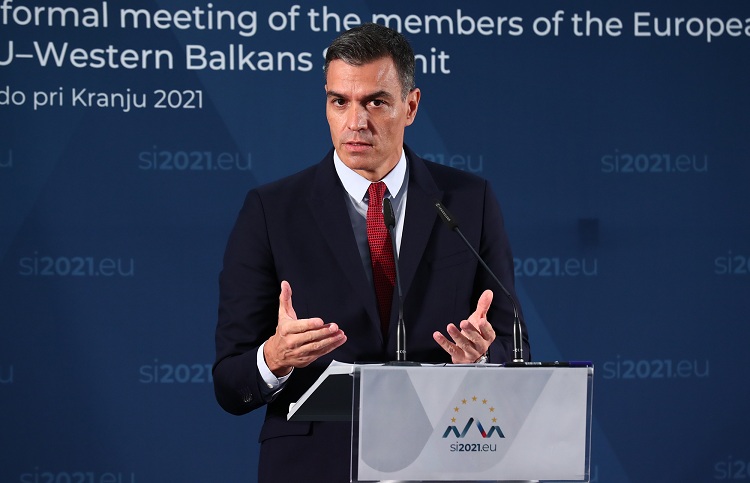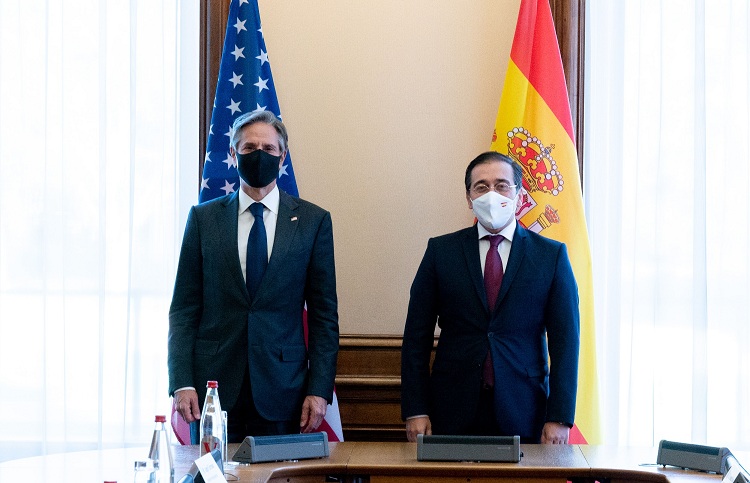The Diplomat
Pedro Sánchez became yesterday, during the EU-Western Balkans summit, the first Spanish Prime Minister to coincide at the same table with a Kosovar leader since the unilateral declaration of independence in 2008, which, according to the PP, is a “new foreign policy nonsense” that “breaks with more than a decade of State position on Kosovo”.
Sánchez participated yesterday in Slovenia in the Summit of the European Union and the Western Balkans, in the course of which he defended the importance of promoting the political, economic and social transformation of the area, especially in terms of rule of law, economy and regional cooperation, with a view to its “European perspective” and the enlargement process. “The Western Balkans are an integral part of Europe and their future lies within the European Union,” he said.
The Summit brought together the leaders of the 27 EU countries together with representatives of Serbia, Montenegro, Bosnia and Herzegovina, North Macedonia, Albania and Kosovo. Therefore, Pedro Sánchez agreed with the Kosovar leader, despite the fact that Spain does not recognize the independence of this former Serbian territory – as do Greece, Romania, Cyprus and Slovakia – because, as he himself explained to the media, “it is important to be in all forums, Spain has to be in all forums”. “What a government that is active in the European debates has to do is not to withdraw from them”, because “can you imagine if Spain was absent from this summit when the other 26 Member States have been there? We have to be in the debates to give our opinion,” he said.
Pedro Sánchez even acknowledged yesterday that he had personally greeted Kosovar Prime Minister Albin Kurti, to whom, he said, he welcomed “the dialogue between Pristina and Belgrade” and encouraged “both sides to find agreements that are consistent with international law and satisfy both”. In any case, and in order to avoid uncomfortable situations, the Slovenian Presidency of the EU decided that during the Summit there would be no national symbols (except for the flags of the Union and Slovenia), so that all the participants were identified by means of signs on which only their names appeared, without mentioning country or position, in order to avoid mentioning the Kosovar leader as Prime Minister.
In relation to all this, the deputy spokesman of the Popular Group in Congress, Pablo Hispán, declared yesterday that the participation of Pedro Sánchez in the EU Summit together with the representatives of Kosovo is “a new nonsense in foreign policy” because “it breaks with more than a decade of the State’s position on Kosovo and accepts its unilateral declaration of independence”. “It is not clumsiness, it is surrender”, he added.
In any case, Sánchez’s position was very different from that held by his predecessor, Mariano Rajoy (PP), during the last face-to-face EU-Western Balkans Summit. At that meeting, held in May 2018 in Bulgaria -in the midst of the Catalan crisis-, the then Prime Minister attended the informal dinner with the rest of his EU colleagues, but returned to Spain on the morning of the following day to avoid a meeting with the Kosovar leader and left the representation of Spain in the hands of ambassadors and secretaries of state. The 2020 Summit was held via videoconference from Croatia because of the COVID-19 pandemic and was attended by Pedro Sánchez, but flags and positions were also avoided for exactly the same reasons as this year.
The penultimate chapter in the twists and turns Spanish diplomacy is forced to coincide with Kosovo in international events without recognition came during the recent soccer matches between Spain and Kosovo in the framework of the qualifiers for the 2022 Qatar World Cup in Qatar, in which the Kosovar team was referred to by the commentators of Televisión Española with expressions such as “the team of the Kosovo Federation”, the “Kosovar team” or “Spain’s rival”. During the first leg match in Seville, the anthems of Spain and Kosovo were sung, although the latter was not even mentioned by the announcers, and the flags of Kosovo and Spain were waved, but no images were shown.
Visit to Croatia
After the meeting in Slovenia, Pedro Sánchez went to Zagreb to meet the Prime Minister of Croatia, Andrej Plenkovic, to whom he conveyed Spain’s support for Croatia’s entry into the euro zone and the Schengen area, two objectives that the Croatian government hopes to achieve by 2023.
The president’s trip – the first official visit by a Spanish head of government to Croatia since its independence – is part of the preparations for the 30th anniversary of the establishment of “intense” bilateral relations between the two countries, which will take place in 2022. “In these almost three decades of diplomatic relations we have managed to share values, challenges and objectives. And we have common positions on a multitude of issues, which justify that we strive to become even closer,” he said. During his stay in Zagreb, Pedro Sánchez was received by the President of Croatia, Zoran Milanovic, at the Presidential Palace, and held a meeting with the Speaker of the Croatian Parliament, Gordan Jandrokovic.







